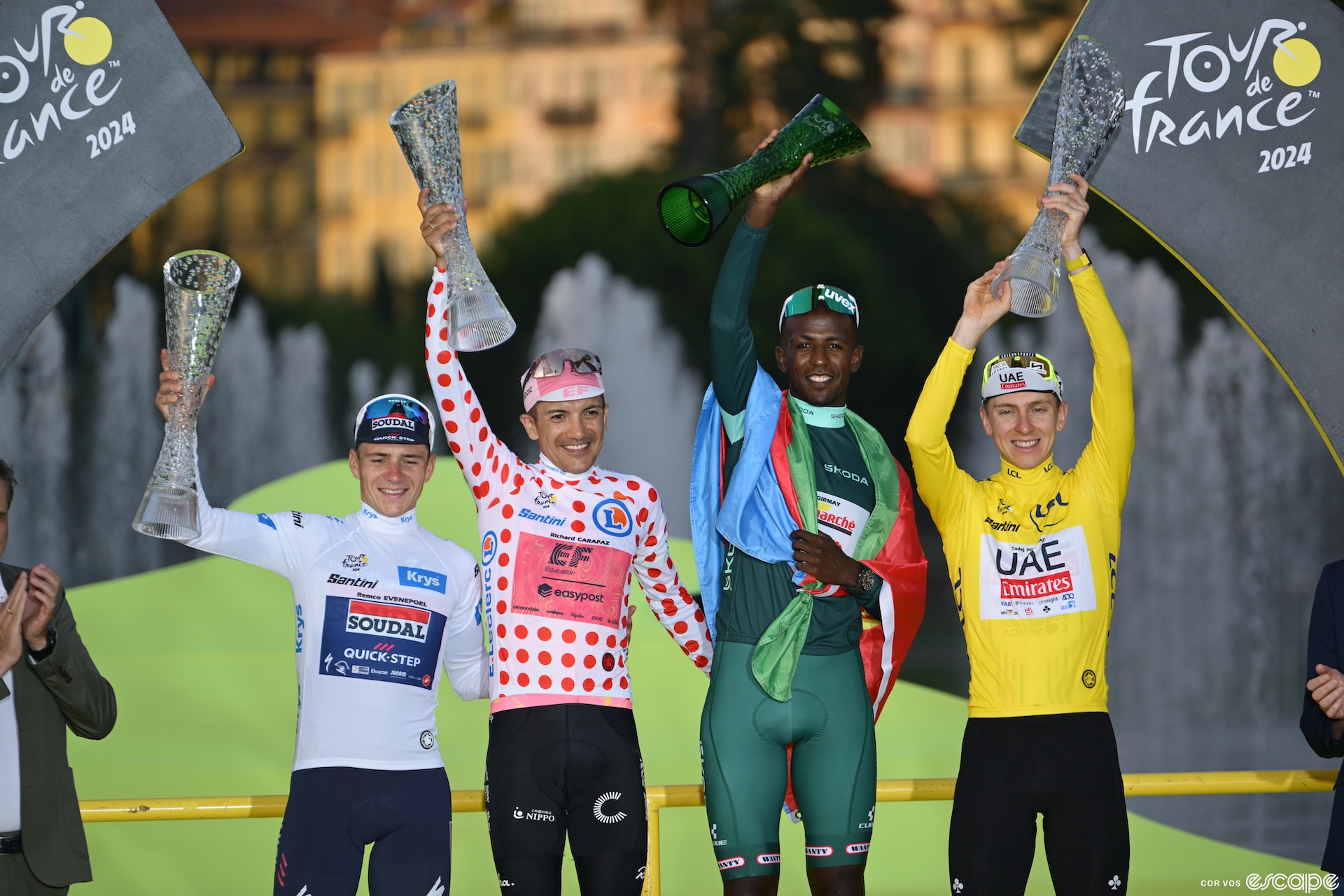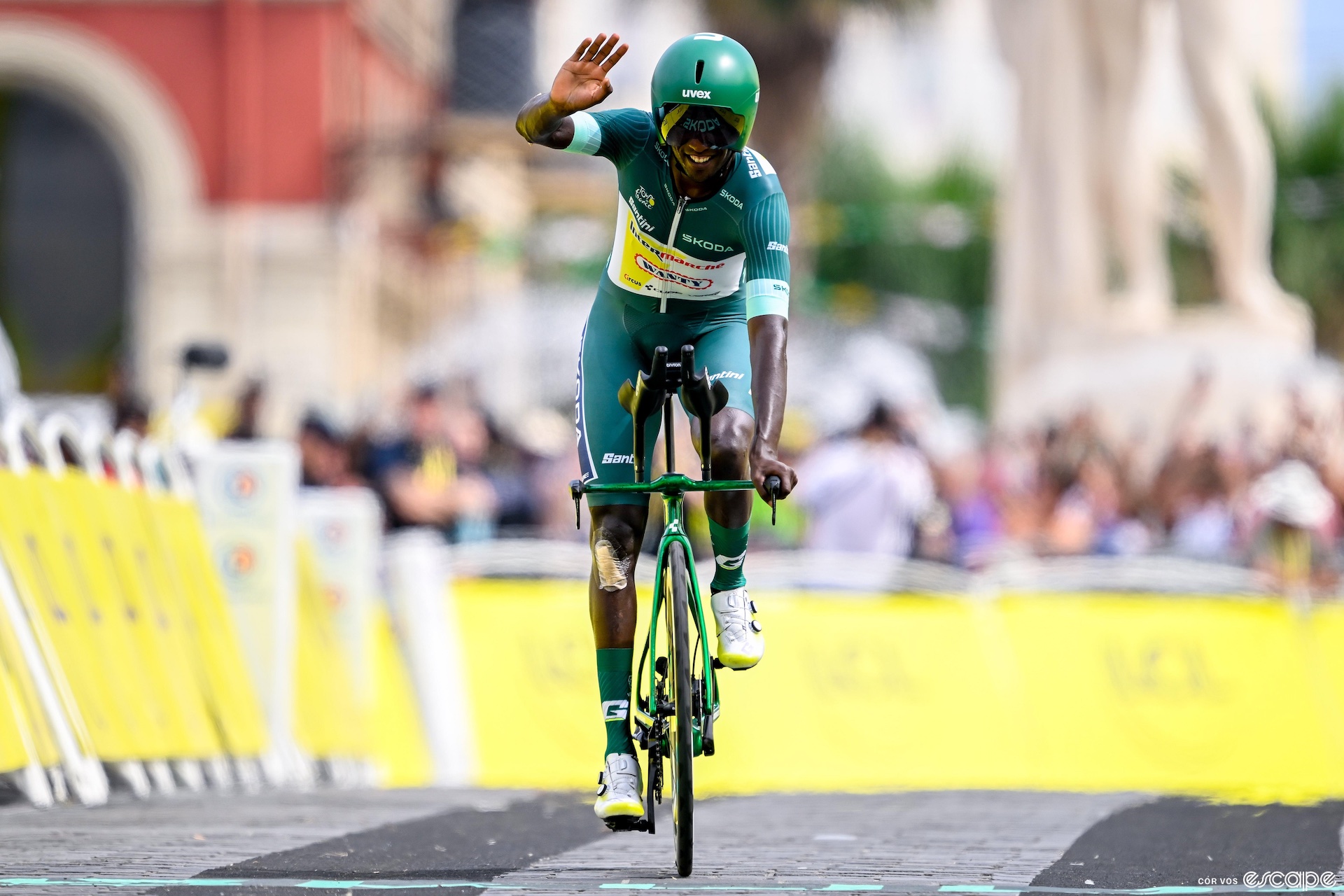As he crossed the finish line of the stage 21 time trial on Sunday in Nice, Biniam Girmay (Intermarché-Wanty) officially won the Tour de France points title, becoming the first Black rider in history to do so.
His green jersey campaign was built on a foundation of three stage wins (on stages 3, 8 and 12) and bolstered by a determined pursuit of intermediate sprint points day in and day out across nearly three weeks. On Sunday, however, with a mathematically unassailable lead, he could finally soak it all in and enjoy one last day in green in front of the crowd in southeastern France – a crowd that included many Eritrean fans and his family as well.
"I'm really grateful today," he said with a thoughtful smile on his face in a television interview. "I've never been happy in my life like today, in front of my country, my daughter's here. A really beautiful day. Unforgettable."

Girmay has been in green since all the way back on stage 5, although in those early days, the idea of him holding onto it for the remainder of the Tour seemed unlikely. Adding to his wins total and racking up enough points to stave off last year's winner, Jasper Philipsen of Alpecin-Deceuninck, would be a tall order.
Girmay did just that. Although Philipsen did go on to equal Girmay's win total of three, Girmay was more consistent at the finishes, placing highly even when not winning, and also more effective at the intermediates. Throughout the Tour, he combined excellent positioning with a newfound level of top-end speed to turn one opportunity after another into points.
He had a bit of a scare on stage 16, when he crashed ahead of a sprint that Philipsen won, scoring no points and suffering a gashed elbow that required stitches, but he escaped serious injury. He pushed through the pain to start the following day and held on through the Alpine stages that followed.
When all was said and done, he finished the race with a total of 387 points to Philipsen's 354.
All told, it was a Tour that far, far exceeded his and his team's expectations, as Girmay said in a statement released by Intermarché on Sunday.
"I don't have the words. I didn't come to this Tour de France with the ambition of winning the green jersey, but simply to demonstrate my qualities. You could say I succeeded," he said.
"I'm grateful to everyone who helped me finish this Tour de France with the green jersey. When I woke up, I thanked God for this unforgettable day. I'm overwhelmed with emotions."
Even before the Tour, Girmay was no stranger to making history, having already become the first Black African to win a major Classic (at Gent-Wevelgem in 2022) and a Grand Tour stage (at that year's Giro d'Italia). Three stages and a major jersey at the sport's biggest race, however, represent a massive step forward for the 24-year-old, and in that way, a massive step forward for the wider world of cycling.
Throughout its history, pro road racing has been dominated by white riders from Europe, with a handful of North Americans and Australians in the pro peloton as well. Recent decades have seen the emergence of riders from South America, with a few Asian and Black French and African riders also racing at the WorldTour level, but the peloton remains overwhelmingly white and European.
Now, however, other young Black riders in Africa have had a chance to watch Biniam Girmay win multiple stages at the Tour de France en route to taking the huge prize that is the green jersey. The door is open for others to follow Girmay's example.
"My adventure on this Tour opens a new chapter in the history of cycling, for us Eritreans and Africans," Girmay said. "We've been cycling for a long time, but winning stages and a green jersey, it's now possible."
Did we do a good job with this story?






